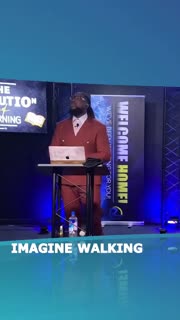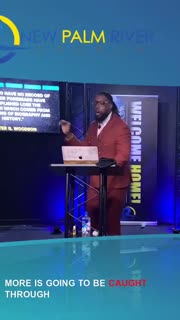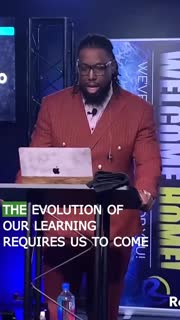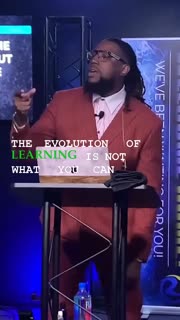Discernment and Growth in Faithful Learning
Devotional
Sermon Summary
Bible Study Guide
Sermon Clips
1) "Imagine walking into a classroom where the curriculum is constantly changing. Much like the world around us, we are faced with a syllabus that includes not just academic subjects, but the more important lessons of faith 101, integrity 102, and resilience 103. In this ever evolving landscape, we must ask ourselves, how do we adapt our learning to remain steadfast in our faith? In two Timothy, Paul speaks about the perilous times and the characteristics of those who have strayed away from the faith. And it's a reminder may change the core principles of our faith remain constant. So we're not just students of knowledge. We're students of the word." [06:00] (54 seconds)
2) "More is going to be caught through example. More is going to be caught through impartation. More is going to be caught through conversation. More is going to be caught through proximity. So if you're walking close. Walk closer. Caught through understanding and revelation of the gifts that God said we are, Jeremiah said, I will give you pastors after my own heart. What will they do? They will feed you with knowledge and understanding. When you catch the revelation that we are gifts to you, it changes what you can receive from us. When you understand that you can withdraw to the level that you desire or need based upon revelation, it changes the entire trajectory of what this relationship can bring you." [09:15] (45 seconds)
3) "When you are, you are drafted into the ministry. So whether you acknowledge your call publicly or not, whether you stand on a pulpit with a microphone in your hand or not, the book tells us that you are a minister. And if you are a minister, Paul also tells us that we are living epistles read among men. What does that mean? Pastor CJ what that means is people are reading your life to determine if there's any credibility to your life. People are reading your life to determine if there is any credibility to your life. People are going to watch what you do before they hear what you say. Can you come closer? People are going to watch what you do to see if it's in congruency to what you said." [11:18] (43 seconds)
4) "Education is not the feeling of a pail, but the lighting of a fire. Education is not the feeling of a pail but the lighting of a fire. If you come here to this church, you are going to present, you're going to be presented information and you're gonna be presented revelation on a completely different level. I firmly understand that my teaching and preaching style is very confrontational, and it challenges you to be a critical thinker. This is not the place where you get three points of clothes filled with cliches. I'm gonna challenge you to think and rethink what you think you know." [12:11] (28 seconds)
5) "The evolution of our learning requires us to come to a place of not just knowledge, but the ability to recognize and actualize truth. It's not enough for you to be able to discern what is truthful and what is a lie. That's easy. That's elementary. What becomes challenging for us is to now recognize truth and then actualize it or embody truth. Jesus said, my words are true. He says, I am the way the truth and the no man can come to the father except he come by. And if you come any other way, you are a thief or. I love this church." [27:55] (42 seconds)
6) "The evolution of learning is not what you can learn. It's not what you can withhold or hold. It's what you can pass on. We know that you are ready for the next level because you have mastered what has been taught to you and now you are reteaching it to others. That is the evolution of learning. That is how we make disciples. My goal for next year is for you to have at least twelve disciples. What you mean, pastor? Twelve people that you were actively poor." [32:39] (34 seconds)
7) "When we grow and we develop and mature in our faith, we don't fall for some of the things that would deter us from the truth. Maturity says that we can come into the evolution of our faith and the principles that yield fruit and harvest as christians, as believers, it is so important that we understand the responsibility that we have as partners, as members of the ministry to help support the ministry. How do we support the ministry, pastor? Yes, we do it through prayer. Yes, we do it through attendance, but we also do it through seed sowing or our offerings." [45:25] (36 seconds)
Ask a question about this sermon
2) "More is going to be caught through example. More is going to be caught through impartation. More is going to be caught through conversation. More is going to be caught through proximity. So if you're walking close. Walk closer. Caught through understanding and revelation of the gifts that God said we are, Jeremiah said, I will give you pastors after my own heart. What will they do? They will feed you with knowledge and understanding. When you catch the revelation that we are gifts to you, it changes what you can receive from us. When you understand that you can withdraw to the level that you desire or need based upon revelation, it changes the entire trajectory of what this relationship can bring you." [09:15] (45 seconds)
3) "When you are, you are drafted into the ministry. So whether you acknowledge your call publicly or not, whether you stand on a pulpit with a microphone in your hand or not, the book tells us that you are a minister. And if you are a minister, Paul also tells us that we are living epistles read among men. What does that mean? Pastor CJ what that means is people are reading your life to determine if there's any credibility to your life. People are reading your life to determine if there is any credibility to your life. People are going to watch what you do before they hear what you say. Can you come closer? People are going to watch what you do to see if it's in congruency to what you said." [11:18] (43 seconds)
4) "Education is not the feeling of a pail, but the lighting of a fire. Education is not the feeling of a pail but the lighting of a fire. If you come here to this church, you are going to present, you're going to be presented information and you're gonna be presented revelation on a completely different level. I firmly understand that my teaching and preaching style is very confrontational, and it challenges you to be a critical thinker. This is not the place where you get three points of clothes filled with cliches. I'm gonna challenge you to think and rethink what you think you know." [12:11] (28 seconds)
5) "The evolution of our learning requires us to come to a place of not just knowledge, but the ability to recognize and actualize truth. It's not enough for you to be able to discern what is truthful and what is a lie. That's easy. That's elementary. What becomes challenging for us is to now recognize truth and then actualize it or embody truth. Jesus said, my words are true. He says, I am the way the truth and the no man can come to the father except he come by. And if you come any other way, you are a thief or. I love this church." [27:55] (42 seconds)
6) "The evolution of learning is not what you can learn. It's not what you can withhold or hold. It's what you can pass on. We know that you are ready for the next level because you have mastered what has been taught to you and now you are reteaching it to others. That is the evolution of learning. That is how we make disciples. My goal for next year is for you to have at least twelve disciples. What you mean, pastor? Twelve people that you were actively poor." [32:39] (34 seconds)
7) "When we grow and we develop and mature in our faith, we don't fall for some of the things that would deter us from the truth. Maturity says that we can come into the evolution of our faith and the principles that yield fruit and harvest as christians, as believers, it is so important that we understand the responsibility that we have as partners, as members of the ministry to help support the ministry. How do we support the ministry, pastor? Yes, we do it through prayer. Yes, we do it through attendance, but we also do it through seed sowing or our offerings." [45:25] (36 seconds)







